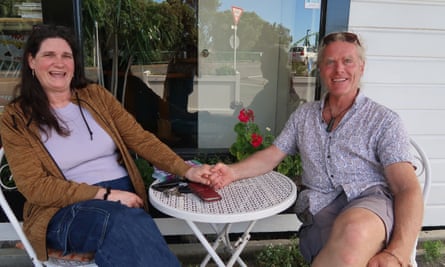I met Marianne in 1992 when I started working as a chef at a cafe in Melbourne. She was a waitress, and I thought: “What a bloody noisy Yank!” I’d been reading lots of John Pilger so I had a disdain for US geopolitics.
After I pushed that out of my system, we flirted madly from one side of the counter to the other. We consummated our relationship at the staff Christmas party. She threw me over her shoulder and took me home – I was just a country boy and she knew what she wanted. The next morning she cooked me huevos rancheros with heavenly black coffee.
We spent every second together for the next six months. We’d cycle all over Melbourne – Marianne sitting on my handlebars – and have romantic picnics in parks. We laughed and talked endlessly; our similarities and differences worked together like a Rubik’s Cube.
Then Marianne became deathly ill with strep throat and septicemia and ended up in the hospital for a month. In that time she had an existential crisis. She was about to turn 30, so the alarm clocks were screaming. I was 26, and even though I was visiting her in hospital every day, her ex – an Israeli who lived in her home city of Los Angeles – undercut me and convinced her to come back to him. Marianne’s friends were having children and she wanted to have babies, so there was all this pressure.
When she left Australia, I naively thought: “Oh, we’re in love with each other – she’ll be back in five minutes.”
We didn’t see each other again for 23 years.
After she left, I drifted. I worked in the mines in Western Australia, thinking security and amassing a fortune was the key to capturing a woman’s heart. Marianne and I stayed in contact by writing letters. I rang her one day out of the blue in LA – but she was just about to get into a taxi to go deliver her first child.
I moved to Port Fairy in Victoria to open a restaurant, and Marianne converted to Judaism and moved to Israel with her husband. As our physical addresses changed, we lost touch.
One day, in 2004, I had some customers who worked for the US embassy. I said: “How do I get hold of someone who’s a dual citizen, last heard of somewhere in Israel?” They said: “You write or email the US embassy in Tel Aviv, and you say: ‘Can you please find this woman, it’s a matter of urgency.’” At the end of my shift, I did just that.
A week later Marianne emailed me, saying: “Andrew, is that you?”
By this stage I had been married and was divorced with a young child. Marianne had also divorced, had two sons and was living with someone else, but was not very happy. We thought about meeting up in Italy but it wasn’t practical. We both had children we needed to raise in different countries.
We kept in touch but our emails skirted around our feelings. In 2009 I got married a second time and had two more kids. That relationship ended in 2014.
In May 2016, I jumped online to see who was active on Messenger and saw Marianne there. We chatted for hours, and again the next day, and really started to open up to each other. Marianne had separated, and her youngest son was about to finish school. She planned to move back to the US later that year.
I said: “I think I’ve got some of your old letters around the house. I’m going to find them.” I opened one, read the first paragraph and thought: “Oh, you idiot!” It took me back to how deeply in love we were. I had buried that love for so long, trying to fill it with someone or something else.
The next day I messaged her: “We need to talk, what’s your phone number?” The second I heard her voice again, the planets realigned.
We began talking for hours every day. We needed to find out if there was something more than friendship, so Marianne flew to Melbourne. I picked her up from the airport and drove her around all the places we used to frequent 23 years ago.
She was the same person. There was joy and excitement at being back together, but a lot of grief too – of having missed all these possibilities, including having children together.

We were lovey-dovey, telling everyone our story, bouncing on clouds. We tried to get back Marianne’s old residency visa by writing this beautiful letter to immigration about our love story. We thought: “Anyone who reads this will just go, ‘Yep!’” Eventually, immigration replied with their verdict: REJECTED!
Not long after, my ex-wife announced she was moving to New Zealand with the children. We’d never been there, but when Marianne and I Googled Nelson, it ticked all our boxes – ocean, mountains, arts and culture. When we arrived in winter, we didn’t have two bob to rub together, and only one of us could work. All we had was love.
Two and a half years ago, we opened Little Dove cafe. Now Marianne is the chef and I’m the waiter. It’s been challenging living together, running a business, renovating a house and raising children. But I wouldn’t swap her for the world.

